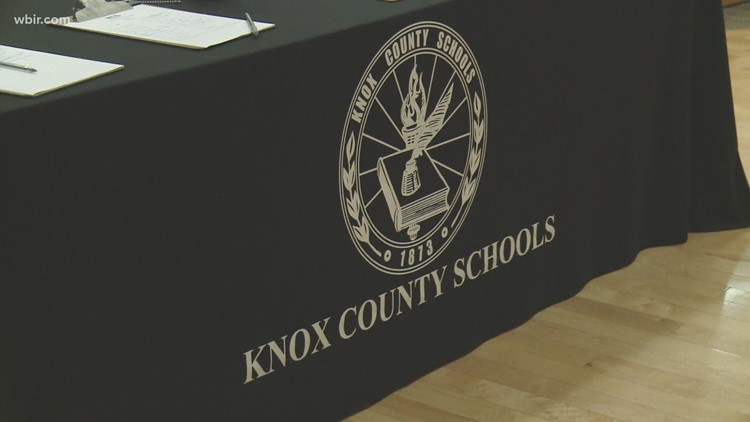KNOXVILLE, Tenn. — On Thursday, the Knox County Schools Board of Education met for its regular meeting. Among its agenda were two proposals that would change the school district's anti-discrimination policies, removing specific protected classes and replacing them with generalized language.
The specific policy changes that Knox County Schools is considering would first change its policy on the harassment of students. Currently, the policy says Knox County Schools does not "tolerate harassment for any reason including, but not limited to, harassment on the basis of actual or perceived gender, sexual orientation, national origin, disability, religion, race, color or any other Federally identified protected area."
The proposal changes the policy to say it does not "tolerate harassment on any basis."
Another proposal changes Knox County Schools' equal educational opportunities policy. Currently, the policy says "all students shall have the same opportunities with regard to programs and activities regardless of race, color, creed, religion, national origin, sex or disabilities."
The new policy would say, "All students shall have equal opportunities with regard to programs and activities." It would also specifically allow students to anonymously report instances of discrimination, and would require the school district to investigate those reports.
On Thursday, the school district decided to delay the vote to give the law department more time to work with other leaders on the proposal's language. The proposals came after Public Chapter 0780 went into effect, which changed the state's Teacher Code of Ethics to similarly replace anti-discrimination language.
"One of the questions we have is that when they're citing these different codes or laws or amendments for the reason why they're changing the language in these policies, where is that instruction coming from? It's not in the Teacher Code of Ethics," said Aly Chapman, from the Tennessee Equality Project. "Unfortunately, what we're seeing is this is happening everywhere. It's not unique to Knox County, it's not unique to the state of Tennessee. There's efforts to try and dilute the language of policies that protect queer people and LGBTQ+ youth."
The Tennessee Equality Project, an LGBTQ+ advocacy group, organized an event and encouraged people to attend the meeting on Thursday. While changes to the anti-discrimination policies were among its concerns, it also encouraged people to attend the event and speak about a memorandum sent to principals on Aug. 6 about how to follow a separate state law — Public Chapter 0832.
That law requires educators to tell parents if students request they use pronouns or names that don't align with what is listed on their birth certificate. Advocates condemned the law as forcefully "outing" transgender students who may not have supportive parents.
Chapman was among the speakers at Thursday's event. They said they wanted the memorandum to be discussed as a policy, giving parents and community members to weigh in on how the state's law should be implemented.
Knox County Schools said it only changes or adds to policies if state law or state guidance requires the school district to do so, or if a change in the law makes a change in existing policy. It also said it "consulted internal departments" to create the practices.
The memorandum includes a list of seven "required best practices" educators need to follow if students request to use different pronouns or names. Those seven practices are listed below.
- If a student requests to be called a name inconsistent with their sex at birth, a pronoun which does not correspond to their sex at birth, a restroom different from their sex at birth, or other type of sex/gender accommodation.
- The school staff will email the student’s Principal.
- The principal will include counseling and may ask additional questions of the student, and inform the student the school is required by law to notify the parent and seek permission from the parent. When appropriate, the administrator will call the student’s parent or legal guardian.
- After three (3) phone attempts over 3 days, the administrator may email the parent/guardian.
- The administrator will email the conversation results to the student’s teachers and other pertinent school staff.
- Administrators will keep the parent communication for documentation and a list of parents who have been notified.
- Administrators will complete the following Title IX Gender Identity Accommodation Form.
"One of the reasons we would like for it to be a policy is, one, for enforcement, public debate and discourse, and to give the opportunity for people from the community ... anyone in the community who can speak to what these things mean for real LGBTQ+ kids in Knox County Schools," said Chapman. "We need to actually talk about these things, and have those difficult conversations."
They said they planned to ask the Knox County Board of Education to give the community more time to consider the changes to anti-discrimination policies and the best practices for implementing Public Chapter 0832.
Knox County Schools said it would continue to monitor how the Public Chapter 0832 is implemented to determine if additional support is needed. The school district's full statement is available below.
"We generally only change/add to policy as a result of changes to the law if 1) the law or state guidance require a policy; or 2) the change in law makes a change to existing policy that needs to be adjusted accordingly.
We consulted internal departments to create guidelines that would be in compliance with state law and supportive to students and families.
In terms of our process, we followed the same protocols in developing these guidelines that we would for any other change to state law. District administrators provided operational guidance to principals that would ensure compliance. As with any new guidelines, we are continuing to monitor implementation to identify whether additional support or clarity is needed."



